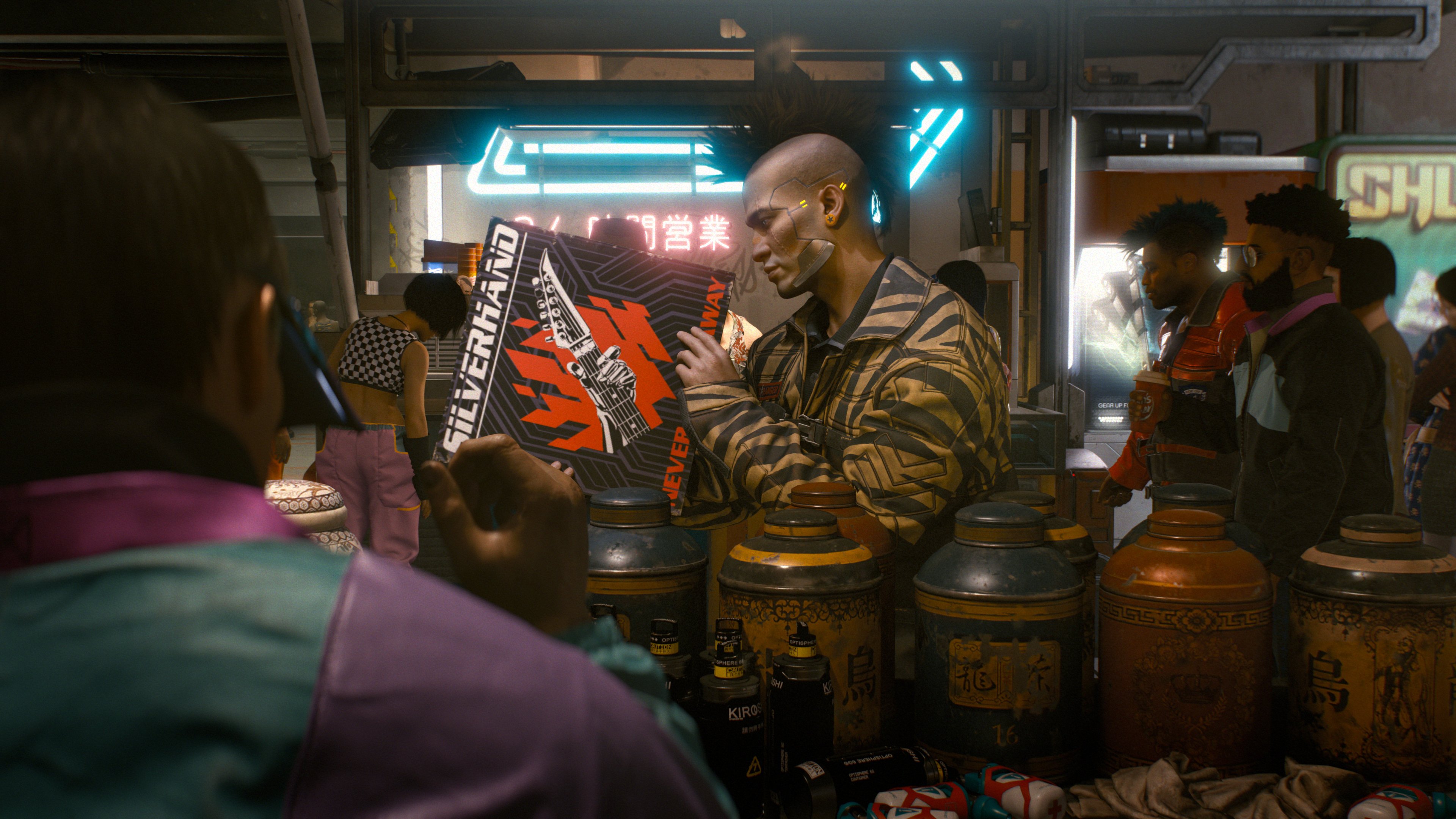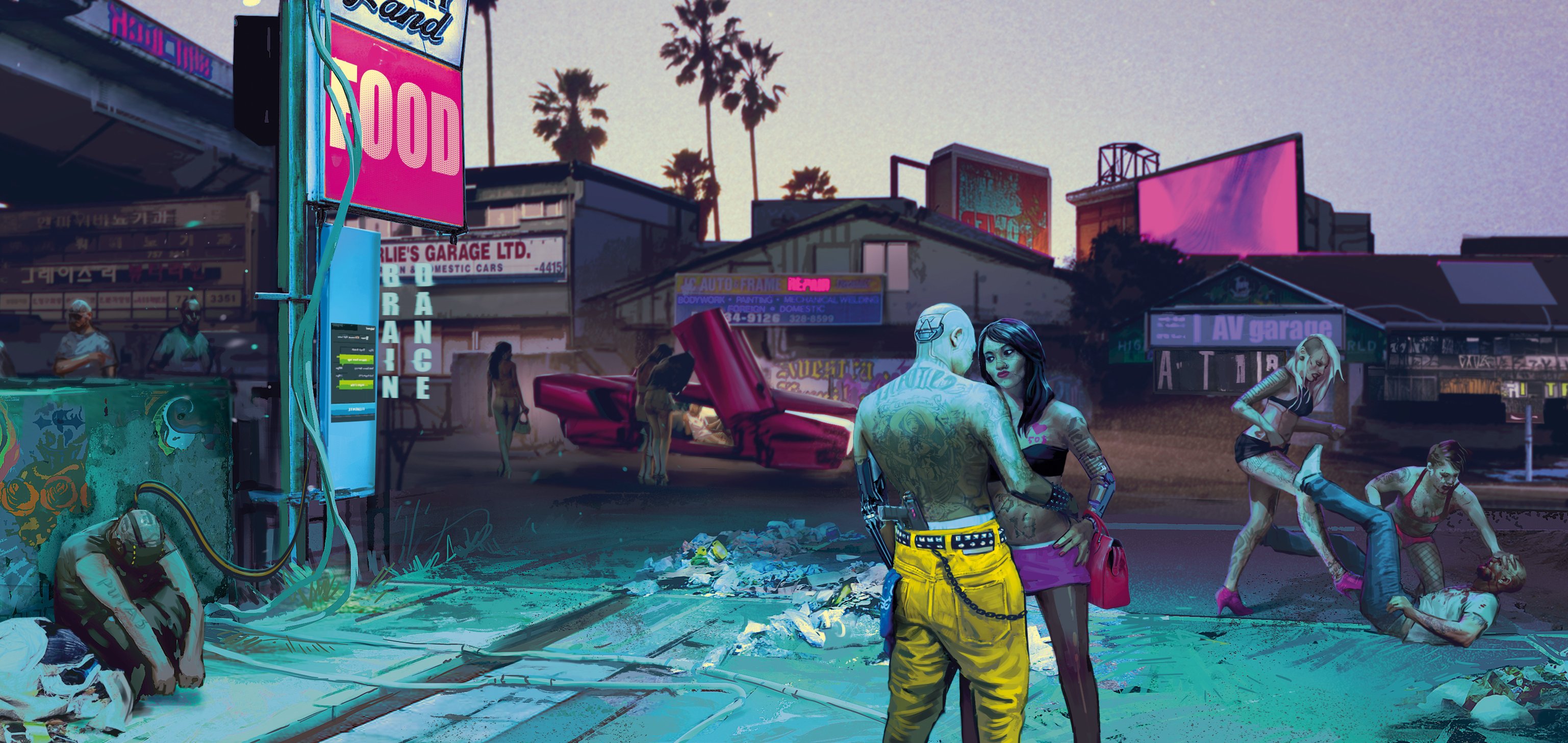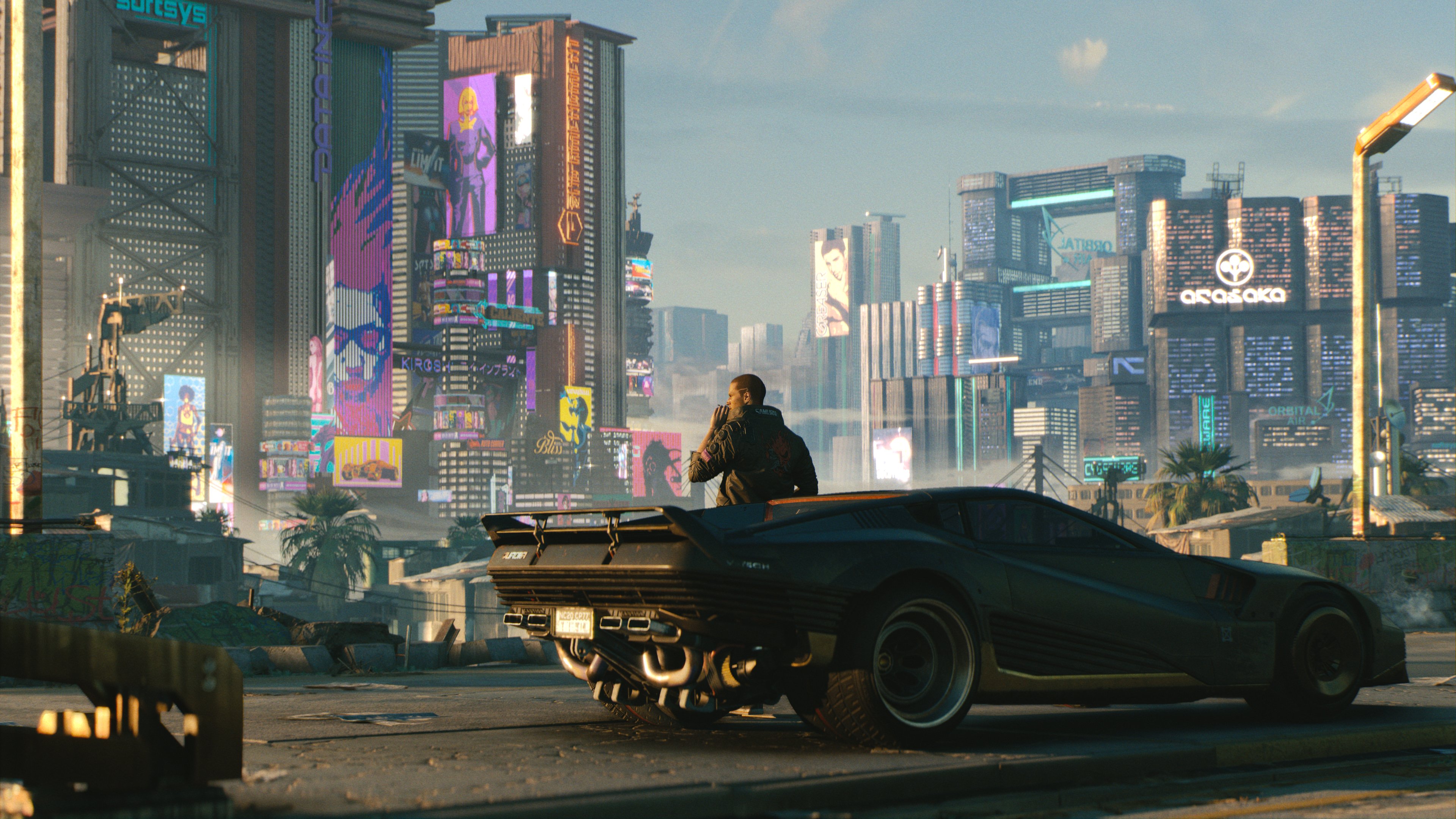Cyberpunk 2077 interview: "We wanted to test ourselves as a studio" to make a game so different than The Witcher
CD Projekt talks world design, why Cyberpunk is first person, and making such a bold departure from The Witcher 3.

We learned a lot about Cyberpunk 2077 from its overwhelming hour-long E3 demo, but that hour still left us with more questions than answers. On Thursday we sat down with CD Projekt Red level designer Max Pears and asked him about the design of Night City, how driving will work, what it's like to make environments for both shooting and roleplaying, and more. Here's what he had to say.

You can follow Pears on Twitter here. He also runs a podcast about game development called Level Design Lobby.
PC Gamer: Let's talk about the city. I think that's one of the most striking parts of Cyberpunk. It was staggering how dense the city felt, how alive it felt. What kind of challenge was it to create something like that?
Max Pears: One of the biggest challenges is that seamless transition from being in a mega building—these buildings, depending on the district you're in, are going very vertical. So you've got your own kind of, ecosystem, in the sense that there are different things happening in those buildings than on a street level. So having that transition there has been one of the bigger challenges. From that, as well, it's about making it feel dense. We want it to feel packed, depending on the district. Making sure it feels alive. That's been the big part. Not just alive as in it's populated with numbers, but it feels like stuff's actually happening around you.
During the demo the person running it said something like 'thanks to our new crowd technology we're able to do this.' Is that something you've significantly improved on over The Witcher 3, how you generate crowds and handle that?
I can't say too much detail on it, but as you saw, in Witcher 3, in Novigrad for example, you had loads of people moving around there. So we are looking into expanding and improving on these things. I can't say much, but it is something we're definitely looking into, for sure.
Another thing I noticed in that demo is there's a scene where you're walking down an alley and they point out a crime scene on the side and say "Night City's dangerous, crime's happening all the time." What I was curious about is how dynamic or how static Night City is. Is that crime scene something that's always going to be there in that district?
This stuff is going to depend on, we've got dynamic weather and day and night cycles. Things are going to happen differently depending on that time and weather. I can't go into too much detail, but there's going to be a sense of feeling a different space, and how it feels different in those time events, as well.
Keep up to date with the most important stories and the best deals, as picked by the PC Gamer team.
Okay, so returning to that same area, things will be changing as you go?
Yeah.
Because you're a level designer, I'm curious—this is a roleplaying game and a shooter, I feel like there's a massive challenge in combining those two very big genres and making both parts feel equally satisfying. Level design is so paramount to making a good shooter. How are you designing these environments that enable roleplaying, feel realistic and immersive, but also make for a good shooter experience? The two don't always go hand-in-hand, you know?
I think you hit the nail on the head when you say they don't always go hand-in-hand. But one of the things that's been great to work on this game, from my personal perspective, is that class system. We showed a bit today. There's the three you can have: netrunner, techie, solo. Each of these is going to have a different way to solve a combat encounter or an environmental challenge.
Having that makes this easier, in the sense that because it's about choice, that way there's more options for you to handle those situations differently. Because of that you'll be able to move through the space, and you'll have the traditional sense of that sort of shooter space, but to layer that extra stuff on top, that excitement when you use those abilities for that class system—that's what's made it an exciting thing, from my point of view, to make the levels. And I know the rest of the team, the other level designers, enjoy having those choices.
How interactive are levels? I know at one point you can talk to an ad and it'll give you a HUD marker. I noticed during that boss fight, they shot the car on the jack and it dropped down and made improv cover. Can you talk a little more and expand on that?
We're going to look at not only having destructible cover, but also using cover in a different way that you might not have seen or done in a previous game.
Max Pears
As you saw in Witcher 3, we're really trying to focus on: every action has a reaction. So that's taken from the big picture, and we're bringing it down, again and again, to those levels. Even just interacting with an ad. We're trying to have that, so it does come into play. We highlight those options for you. I don't want to give away too much. I want people to get hyped. It is about how you interact with things, because that's going to have an impact and maybe change certain parts of the levels as well.
Do levels have any destructibility to them?
I don't know if I can say too much on that. But it's something we're looking into, for sure. But how far we push it, I can't say.
Whether it's tactical destruction or purely aesthetic, is that what you're looking at?
I don't know if you saw in the demo, we have one of these weapon types, just called damage weapons, where you saw him shoot through the cover. We are going to have some element of destructible cover and different types of weapons using the environment differently. Because you may have shot through cover [with one weapon], but we have another one, the tech weapons, where it's the ricochet, so you can shoot that off there. So we're going to look at not only having destructible cover, but also using cover in a different way that you might not have seen or done in a previous game.
I know this isn't exactly your field, but I think when the initial reactions were rolling out, we were one of the first people to publish articles saying, holy shit, this is a first-person shooter roleplaying game. That took a significant number of people by surprise. They had come to expect CD Projekt Red to make a certain type of roleplaying game, and suddenly you're really throwing people for a loop. I've seen a lot of skepticism from people who haven't seen the demo. Why did you choose to go that direction versus a third-person game?
The reason for this, and it was a purposeful decision, it wasn't just us saying 'hey, let's do it,' for Cyberpunk, CD Projekt Red wanted to make—and even with Witcher, story's so important to us—we felt that when you are first-person, it immerses you better.
Say with Witcher, you're really immersed in that game, but you're kind of with Geralt. Here, in Cyberpunk, because you create your own character as well, being first person, it's more your story, it's more your adventure, of a cyberpunk. What are you going to do in this world? That's why we chose first-person perspective, in terms of making it more immersive. Using it as a story technique. That's why we want to go for that. If you haven't seen the demo, just believe us that we're not doing it to scare or anything. We're doing it because we believe it can help make this game better.

The other part is the shooting. You guys are a studio known for a certain type of combat style, and now you're stepping into this territory that is dominated by developers who have really struggled and worked hard to get shooting to feel really good. This is your first foray into that. Can you talk a little about that process to make a game that feels like a good shooter, and how challenging that must be?
One of the big things is, it is a full-blown RPG, so it's not going to feel like other first... we don't want to say first-person shooter, we just want to use the words 'first-person perspective.' It will feel different to a traditional FPS because it is an RPG, so there's going to be numbers. And we've got a great team, so that is a challenge for us. Not only do we have to consider the range in combat, but also think about how that's going to work in terms of stats and figures.
As you saw in the demo, you see numbers bouncing off, so that is a challenge, but the team's up for it. We've already got some really creative stuff with the weapons as well.
Can you tell me what the "cool" stat does?
The cool stat! For example, it's going to unlock certain things that you might not have been able to do, certain options when dealing with situations. Or, another example, the vendors that you have, the ripperdocs, if you have that cool and street cred level, they might bring down certain weapon prices or unlock certain weapons you might not have had there. So it is an integral part of it. It's also a throwback to the original tabletop game as well. So we are thinking of—forgive me for saying this—cool ways to use it. It's going to be an important thing for sure.
Is it safe to say it's basically the equivalence of charisma in other roleplaying games?
It's definitely a way to help interact with people on that front. But I don't want to say if it's a replacement, because I'm a level designer, I don't want to step on toes.
I'm curious to know about Jackie as a character. How does your interaction change based on your gender? In the demo we saw, playing as a woman, it felt like they had... the dynamic between her and Jackie felt really special. How does that change between genders?
That's a question we've often heard, why go for something new instead of preceding from Witcher. But we wanted to test ourselves as a studio.
Max Pears
It's going to have a change, not only with Jackie, but say for example the ripperdoc that you meet. He's quite friendly towards you. That might not be the same way if you're the male version. So even your gender's going to have an impact in different ways. Jackie's a cool character, but there's going to be some other really cool characters in there. That's going to play into things, and how you interact with different people as well. One of the guys you meet from Maelstrom, when he comes over and is like 'you reek of militech,' if you're a male that might go down differently. With these important characters you're going to meet along the way, it's going to have an impact, for sure.
He feels like a teammate, he's on missions helping you out. Are there other teammates?
You're definitely going to encounter different characters that will come with you on different missions as well. So there's a range of cool characters you meet along the way.
And they'll have their own combat styles and feels?
Definitely.
That's exciting... Oh man. It just looked really cool.
It's awesome, we're proud of it as a team, because you never know how people are going to react. We hope. Especially because The Witcher's reception has been amazing, but that's an extra pressure, because you don't want to slip from good grace, so it's been real nerve-wracking. I'm sure everyone back over in Poland were nervous when it was announced as well. Even the trailer, how we did it for Microsoft, we're super proud of and we loved it.
I can't imagine the pressure. The Witcher is heralded as the greatest PC game of the last couple years, so to have to top that, or meet those expectations in a completely different way, you're not playing it safe. You're throwing out the playbook.
Exactly. That's a question we've often heard, why go for something new instead of preceding from Witcher. But we wanted to test ourselves as a studio as well, and what better way to do it than a game which, as you've seen with the demo, it feels similar to Witcher in certain ways but different in others. The pressure we put on ourselves, we don't want to just release something—which is why we love that philosophy 'it's ready when it's ready.' We want you to want to come back. It's important to us that this isn't just a one-play thing. You play it and want to play it again and constantly come back to it. But that pressure's internal.
How does the relationship of driving fit into how you traverse the city? It was so mindblowing for me. Of course the car was in the trailer, but I didn't expect it would actually be a gameplay thing. Can you talk a bit about how the driving works? Are you simulating driving and traffic at a level of say Grand Theft Auto 5, or is it more simplified? More fast travel?
It's definitely not fast travel. You're going to have control over that, and as you saw there's car combat. That's going to be on you as the player, being in those moments as well. Everything you saw in the demo, our player was playing that. So he was driving. It's not fast travel, it's not on rails. It is moving through the world. That's one of the ways you're going to traverse it. It's not just through cars, there's bikes as well. It's an important thing to make that feel good.
How deeply are you simulating the driving ecosystem? Are there also other cars on the streets?
Yeah. There are always going to be other cars. Because we have different districts, each district is going to have its own feel, the density of the traffic as well. So we're looking into how to show that off.
That seems like a really big undertaking, because then are there systems for, can you hit people with your car, can you cause accidents, are there then repercussions?
If you're driving, you're gonna hit someone with your car. [laughs] If you want to be that asshole and hit someone with your car, you can do it.
Do the Night City cops show up and try to attack you if you do?
I don't want to go too much into detail on that one, but like I said, every action has a reaction.
I wanted to talk about the dialogue system. It no longer feels like you're stepping into a cutscene that's structured. How does that system work? Is it real time? Characters can be talking to me and I can almost walk away from them if I want to?
We're still in the process of designing this, but we want to feel that continuous flow. Going back to the coolness points, that might unlock options in the dialogue system that you might not have had. We want to treat this definitely as important. The Witcher had a really good one as well, and the team, again, they're looking at constantly taking it up a notch. So we're doing some really nice things there.
It seemed like you'd eliminated entirely, or significantly reduced, that transition of walking up to someone and pressing a button to talk to them to initiate the dialogue. It felt more organic. You walk up, someone says something to you, and the prompt shows up if you're looking at the character.
It's awesome, and it being first person, that helps to add to that system as well. That's another reason why if people are concerned or nervous, we're treating it with respect. It's not just a gimmick. It helps bring players into it.
There was a point in the demo where you're meeting the corporate agent, and she pulls this guy out of the car who she suspects is the mole. It's this almost totally tangential plot thread. I was almost confused, like, who the hell is this guy? With the way you're approaching writing the story, is it going to be something where each mission you undertake is isolated, or are there going to be a bunch of characters all tangled and woven together, and the deeper you go into that world the more you're going to start exploring these threads that overlap and combine?
You might meet those people or you might have… for example, there was the option to take the gun. So you might end up hypothetically killing off a character that might stop something later. Everything you do, even with the side content, is going to relay back to something you might not suspect later. How we talk to someone, being rude or being an asshole, you doing that is definitely going to have an impact later. You might not know when, but it's definitely going to have an impact. So that guy you might meet later for a mission, something like that.
In The Witcher 3, one of the best things it did was treat side missions like—a lot of people say the side missions were the best part, because they were letting you explore the main characters in ways that had surprisingly overlapping stories. Are you going with the same approach?
One hundred percent. It's exciting to hear that's what people want, as well. Something you do in a side mission might impact a main mission. It's not about establishing 'this is more important, and this is less important' because it's main or secondary. All of these, especially from our writers' perspective, are offering an insight into that world. So we really want to show that in all the ways. And again, try to elevate it from The Witcher. So we'll be looking into things like that for sure.
With over 7 years of experience with in-depth feature reporting, Steven's mission is to chronicle the fascinating ways that games intersect our lives. Whether it's colossal in-game wars in an MMO, or long-haul truckers who turn to games to protect them from the loneliness of the open road, Steven tries to unearth PC gaming's greatest untold stories. His love of PC gaming started extremely early. Without money to spend, he spent an entire day watching the progress bar on a 25mb download of the Heroes of Might and Magic 2 demo that he then played for at least a hundred hours. It was a good demo.




